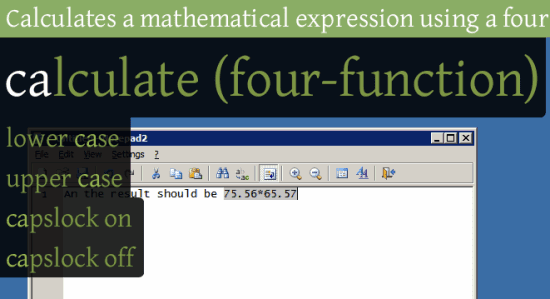"Having to change programs to perform simple tasks -- such as make a quick calculation or look up a definition -- it breaks your concentration, takes you away from the task at hand, and wastes valuable time," said Aza Raskin, president of Humanized and son of the late Jef Raskin, creator of the Apple Macintosh. " Humanized's Enso applications are designed make common computing tasks easier and faster to perform, without breaking focus or forcing the user to switch applications. Enso takes Jef's legacy from vision to reality, revolutionizing the way we use computers the way the Macintosh did back in 1984."
Enso can be seen as a feature launcher. You press Caps Lock and then enter the command that modifies the select data. The program autocompletes the command name, so you only have to type the first letters. Then release Caps Lock and you have the result.

Select a text in any program, enter the google command, and you get the Google results instantly.
Other useful feature is launching programs, which works similar to Launchy. Enso stores all the programs from your Start Menu and lets you access them by typing open followed by the first letters from the program's name. You can also attach short names to files by selecting them and typing "learn as open", followed by the alias.
Another cool command is go. Just type it and a list of the names of all the open windows will appear. It's much easier to switch from Firefox to Open Office, especially if you have a lot of programs that clutter your taskbar.
For now, Enso is a shareware that costs $24.95, works only in Windows and offers limited functionality. But it's also a wise idea that could improve your productivity dramatically if you could write your own commands or download other people's commands.
The video below, which has almost 90 minutes and is titled "Away with Applications: The Death of the Desktop", explains more about this and the author's philosophy on software. Instead of building bloated software, Aza Raskin suggest to build services available at the OS-level, for any other application. "Web applications are often more usable than their desktop-based counterparts because each one does one thing and does it well. Desktop applications used to be the same way, but over time -- as applications grew to support the users in the long tail -- each became a complex portmanteau of all possible features."
No comments:
Post a Comment